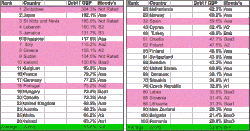13.6.2010 | 23:01
Mjög áhugavert viðtal við Alex Jurshevski á vefnum Itulip.com
Ef einhver mann enn eftir honum Alex Jurshevski, þá var hann í viðtali nýverið á vefnum Itulip.com, sem er óháður fréttavefur með fókus á fréttir af fjármálum og efnahagsmálum.
- Hann hefur á sér það orð, að flytja fremur skeptískar fréttir af kreppunni.
Viðtalið við Alex Jurshevski: Eric Janszen Interviews Alex Jurshevski
Viðtalið má einnig finna á vef RecoverlyPartner.biz Eric Janszen (EJ) Interview with Alex Jurshevski (AJ)
Kosturinn við að lesa það af vef RecoveryPartners er að þar er það að finna í einu skjali.
Þetta er mjög langt viðtal, þ.s. mjög marg mjög áhugavert kemur fram, og ef ég færi að tína það allt til, yrði þetta mjög löng færsla. En, ég hvet fólk til að hafa fyrir því, að lesa það samt sem áður í gegn.
Nokkur atriði, sem vekja sérlega athygli:
"Looking across the entire OECD this year you’re looking at a funding gap on the order of $12 to $13 trillion that needs to be funded and this is going to create pressures in financial markets—pressures we’re already feeling now in the sense that the markets have gotten very balky. There’s limited liquidity in a lot of the funding markets. Many deals are being pulled. Even up here in Canada we’re seeing a number of IPOs for good issuers being pulled because the investor base has simply retreated and is, I think, waiting for things to shake out. This is, in my opinion, one of the worst crises I have ever seen and it’s something I don’t believe is going to go away as a consequence of the “reflate-and-wait” strategy which is what I think the authorities were counting on when they implemented the QE to start off with."
Þetta er ótrúleg tala, sem Jurshevski skekur fram í dagsljósið - þ.e. að sameiginleg fjármögnunarþörf allar OECD ríkjanna í ár, sé 12.000 - 13.000 milljón dollarar.
- Ég hafði ekki þessa tölu, en þetta er þ.s. ég hef átt við, þegar ég hef verið að tala um, að á þessu ári sé verið að setja heimsmet í sölu ríkisskuldabréfa, af hálfu ríku iðnríkjanna.
- Þetta er stormurinn, sem hefur ríkt allt þetta ár og ríkir enn.
- Hann stafar af stórum hluta af því, að öll ríkin voru að pumpa peningum inn í hagkerfin, í von um að það framkallaði hagvöxt.
- Vandinn sem þetta framkallar fyrir okkur - nánar tiltekið - er að þetta offramboð skapar þ.s. kallað er "Buyer's market" þ.e. kaupandinn stendur frammi fyrir því að geta valið milli seljenda þ.s. seljendur séu fleiri en kaupendur, og þar með krafist fríðinda.
- Það síðan veldur því, að seljendur með veikari stöðu lenda í þeim vítahring, að veðra að bjóða stöðugt upp sín kjör til að viðhalda áhuga seljenda - þ.e. vaxtamunur milli öruggra seljenda og þeirra sem eru minna öruggir, fer stöðugt upp.
- Þetta ástand var þegar til staðar, þegar Evru krísan hófst og magnaði ástandið upp enn meir, og breitti stormi á lánamörkuðum í fárviðri.
- Heildar niðurstaðan, er að erlendir lánamarkaðir eru í reynd lokaðir, þegar kemur að löndum í hæsta áhættuflokki eins og okkur.
"Well, exactly. Going back to first principles, there really is no evidence of a “Keynesian Multiplier.” I mean this idea that if the government steps in and fills an output gap it’s going to lead to additional activity down the road. There is absolutely no evidence of that historically to ever have worked so what you end up with is the government applying a short-term patch. In previous cycles there was enough underlying momentum in the economy to propel the economy forward to make it “look” like the government stimulus was actually having an effect, but in fact, if you filter out all of the extraneous influences, you typically find that government spending produces slightly less output proportionate to spending, or a lot less. In other words, there is a cost to the activity of reflation and the cost gets passed on to future generations."
- Áhugavert, að Jurshevski segir að það sé ekki til staðar nein skotheld sönnun fyrir því, að sú aðferð að eyða peningum, þ.e. dæla þeim inn í hagkerfið, raunverulega virki.
- Þetta eru fréttir fyrir mig líka.
- En, hugsanleg ástæða er sú, að noktun ríkisins á þeim peningum sem það eyðir til að auka eftirspurn innan hagkerfis, sé miklu mun lakari en ef einkaaðilar sjálfir væru að eyða eigin peningum. a)Hugsanlega sem dæmi, lenda þeir í einhverjum gæluverkefnum. b)Eða, einfaldlega embættismenn hafa miklu mun lakari upplísingar um hvað er skilvirk notkun á peningum innan hagkerfisins, en þeir sem eru að starfa beint innan hinna ímsu starfsgreina.
- Svo ef til vill, er hagkvæmara að lækka skatta fremur en að ríkið dæli peningum beint - sem fyrir ríkið ætti alveg að geta kostað svipaðar upphæðir.
 Klikkið á þessa mynd svo þið getið skoðað hana í fullri stærð.
Klikkið á þessa mynd svo þið getið skoðað hana í fullri stærð.
En, eins og sjá má á henni, er Ísland nr. 10 á heimslista yfir skuldugustu þjóðir heims, þegar skuldir ríkisins eru mældar á kvarðanum þjóðarframleiðsla.
The conditions for successful consolidation in places like Greece, Spain, the UK, the US simply don’t exist because you don’t have the political consensus that’s needed as a first order condition for one of these programs to ever take off successfully. In Greece, for example, you have a very large rentier class that has benefited the last couple of decades from government largesse. The fact that they have a debt problem is why there’s not going to be any political consensus to solve the debt problem—because you have a large part of the electorate that’s benefiting from the current set of arrangements. Therefore, voting in a government that is going to implement a serious program of austerity and get the fiscal house in order is a low probability event. The same is true in Spain and certainly true in the UK and, for that matter, in the US where by many calculations you have over a hundred million electors who are directly tied into federal and state government spending programs in one form or another, whether they’re employees of government, collecting unemployment insurance, welfare, social security, or food stamps. If you’ve got that many people on the gravy train” it’s hard to see how, through an election process, you’re going to get support for austerity where those people end up being the losers –especially when the historical evidence shows that the adjustment could take a decade or more.
The problem the world faces from a policy-making standpoint is that we are caught in this fiscal trap with no real politically feasible way of generating the consensus needed to implement policies that will get us out quickly enough to avoid a more serious crisis.
- Þetta hljómar fremur sannfærandi, þ.e. að sá fjöldi kjósenda er njóti góðs af greiðslum frá ríkinu, sé líklegur til að standa á móti breytingum sem draga úr þeim greiðslum frá ríkinu til þeirra.
- Þannig, að mjög erfitt verði, að framkalla sátt innan hinna ríku svokölluðu velferðarríkja, um að skera beint niður velferðargreiðslur - svo ríkið geti átt möguleika á að minnka skuldir, og þannig forðast gjaldþrot.
- Þegar ég sat með honum Jurshevski í nokkra klukkutíma yfir kvöldverði, þá útskýrði hann fyrir mér, að þegar hann var ráðinn til starfa til að fást við skuldavanda Nýja Sjálands, hafi verið alger sátt milli stjórnmálaflokkanna um að gera þ.s. til þyrfti, til að minnka skuldirnar.
- Án slíkrar sáttar, væri nær ómögulegt að hrinda í framkvæmd því sem þyrfti að framkvæmda, sem væri stórfelldur niðurskurður þangað til að nægum afgangi af útgjöldum væri náð, til að síðan væri hægt að hefja niðurgreiðslu skulda. Það tímabil, þyrfti að standa yfir nægilega lengi.
EJ: Whenever the IMF comes in to “rescue” an economy, the first thing they ask an over-indebted economy to do, one that has too much foreign debt, is to enact austerity measures, to cut government spending and raise taxes. I can’t think of an instance where that didn’t have pretty much the opposite result of the intended result. Rather than help the country repay debt austerity measures shrank their economy and reduced the debtor’s ability to repay foreign debt. Austerity almost invariably triggered capital flight. The word “austerity” when it comes from the IMF in connection with a sovereign debt crisis is a starting pistol shot to begin capital flight.AJ: Well yes. We have at the IMF some very well-meaning people who have never managed a P&L.They’ve never actually been in front of a trading screen and had a portfolio. They’ve never run a business. They don’t understand second-order effects. For example, if you impose austerity on some of these places, the first people to leave are those with portable skills and portable capital. That zaps the capacity of the economy to produce the outcomes the IMF is looking for. You’re correct in saying they typically go the austerity route.
Ég minni á, að Jurshevski lagði áherslu á:
- Lækkun vaxta - til að virkja hagkerfið.
- Lækkun sumra skatta - í sama tilgangi.
- Niðurskurð hjá ríkinu að því marki sem nauðsynlegt er - þ.e. skv. viðmiðum um að skuldir verði ekki óviðráðanlegar.
Þetta er aðeins önnur stefna en AGS, þ.e. hækka skatta, hækka vexti og skera niður útgjöld. En, hver einasta þeirra aðgerða, dregur þrótt úr viðkomandi hagkerfi.
En, eðlilegt er að beita aðgerðum sem hvetja til hagvaxtar, í niðursveiflu. En, á sama tíma - auðvitað - ef horfir í að skuldastaða sé á hraðri uppleið og sé að nálgast hættumörk eða þegar farin yfir þau mörk, þá verður að skera niður.
En, á sama tíma, þarf að gera allt það annað sem hægt er að gera, til að hvetja til hagvaxtar.
EJ: A couple of final questions. What’s the end game? If we have all these countries, including the US, the UK, all across Europe, and several central Asian countries, with excessive debt but unable for lack of political consensus to cope constructively with their debt issues, how is this all going to work out? Drawing from all of your experience, having traveled to all these countries and been involved in all debt restructurings and negotiations, what do you think is going to happen?
AJ: Well, for that I revert back to my roots as an economist. I think what you have to have is a very large recession. You have to have a clean out. You have to have what you normally have in a forest every few decades. It burns down to the ground and then it renews itself. Until we get rid of the deadwood and get rid of all the zombie companies and zombie banks, we’re going to have sub par economic activity. We’re not going to have expanding economies for our kids. I’m talking about this globally. Until we get rid of all of the businesses that are unproductive, the banks that are unproductive and that are sucking resources away from the productive sectors of the economy, there can be no dynamic self-reinforcing growth. There will have to be a reckoning, whether it’s a voluntary reckoning or whether its an involuntary reckoning as a function of some other event, a black swan event like we talked about or some of the other high risk events like another banking crisis. I don’t know. It’s hard to predict because we live in a complex world but until we have that reckoning and the deadwood is cleared out it will not be possible for the global economy to move ahead on a sustainable and smooth growth path. It just won’t be possible because these problems now are too pervasive. They are too wide spread. There are too many institutions that have toxic waste on their balance sheets. Too many institutions are vulnerable to other institutions that have toxic waste on their balance sheets. Too many sets of taxpayers that we now know are not going to be amenable to become the tax slaves of anybody.Maybe this renewal takes place in an orderly way as a consequence of folks coming to a new social contract. I think that’s a low-probability event. I think more likely we’re going to in some way lurch into another crisis and in the end that crisis will produce a fairly violent adjustment and the deadwood will get cleaned out over the succeeding five or ten years, setting the scene for renewal. Sure there’s going to be businesses that will prosper through all of this because they’re businesses that have unique characteristics. During the transition stage, the transformation of the global economy geopolitically, we will see major shifts in terms of how nations use resources, in terms of how we look at the environment. And it’s a bit much to ask all of this can happen in a smooth in seamless way. I think the next generation is going to pay. It’s not going to pay because we did anything intentionally bad in the Boomer generation but the next generation is going to bear the brunt of what I think is going to be a fairly large adjustment in terms of living standards and ways of doing things.
Hann spáir því að stór kreppa sé framundan, og að í framtíðinni verði lífstandardinn sem fólk muni verða að sætta sig við umtalsvert lélegri.
Þetta getur mjög vel verið rétt hjá honum.
EJ: If you were to attempt to characterize the way this adjustment might occur, in the more likely event of a chaotic adjustment to alleviate debt versus one that’s managed through a new social contract, do you see it more likely to occur as a series of defaults or as attempts to inflate debt away, or some combination of the two?
AJ: I think it will be a mix. I think what we’re going to see over the next few years is going to be similar to walking on a crocodile’s back, where you have that serrated pattern. We’re going to see this massive tension between inflation and deflation, with deflation coming from the pressure of default, the pressure of businesses needing to generate cash at any cost, so they cutting prices and labor is cutting its own wages because it wants to remain employed. So you’ve got tremendous deflationary pressures globally. There are also deflationary global price pressures due to over-supply because you have huge new suppliers out there, in China and India, that are able to pump goods out into global markets at global quality levels. Then you’ve got these massive inflationary forces coming from the stimulus efforts of various governments that are going to push prices the other way. I think it’s going to be push-me-pull-you for a while. There will be a lot of volatility. That’s not good for anybody. Eventually I think the things have got to tilt in the direction of another crisis for the simple reason that things are uncoordinated and the machine is
going to spin off its axle. Just look at what happened 18 months ago. I mean here we are in a situation where the Fed, the IMF, everyone is saying everybody’s got to expand their fiscal deficit, expand their structural deficit, massively. Let’s pull out of this recession guys. Let’s avert a worse crash. Expand your monetary policy. Now, only18 months later with the onset of the European crisis, it’s ,“Oh, Gee guys, we’ve got to exercise fiscal restraint. We need austerity. We need to dig ourselves out of this debt problem.” You’ve got a 180-degree policy flip with an economy that is a quarter of the world’s GDP— Europe. You’ve got a 180-degree policy flip within 18 months. This is unprecedented and its also I don’t think an appropriate way to run a very large economy. You don’t flip economic policy back and forth like that. It’s like trying to turn an oil tanker on a dime in the Straits of Hormuz. You’re going to run aground.
Þessi síðasti hluti hefur mikinn relevans fyrir okkur, því ef hann hefur rétt fyrir sér - þá er eða var Grikkland trigger moment fyrir krísu sem mun steyta hagkerfi Evrópu á skeri - og væntanlega í beinu framhaldi, sjálfu heimshagkerfinu.
Kv.
Flokkur: Stjórnmál og samfélag | Facebook
Um bloggið
Einar Björn Bjarnason
Nýjustu færslur
- Trump getur hafa eyðilagt fyrir sjálfum sér: Dómsmálið gegn, ...
- Gæti 3ja heimsstyrrjöldin hafist á Indlandshafssvæðinu? Skv. ...
- Er samningur Trumps við Japan - er inniber 550 milljarða$ fjá...
- Hótel-bókanir í sumar, gefa vísbendingar um kjaraskerðingu al...
- Kjarnorkuáætlun Írana hefur líklega beðið stórtjón, fremur en...
- Netanyahu, virðist hafa hafið stríð við Íran - beinlínis til ...
- Trump ákveður að senda, Landgönguliða - til Los-Angeles! Kemu...
- Möguleiki að Úkraína hafi í djarfri árás á flugvelli sumir mö...
- Yfirlýsing Trumps um yfirvofandi 50% tolla á ESB lönd, afhjúp...
- Tollar Bandaríkjanna á Kína - líklega ca: 50%. Kína á Bandarí...
- Að það verður af hráefnasamningi Úkraínu og Bandaríkjanna - v...
- Margt bendi til yfirvofandi kreppu í Bandaríkjunum! Skv. áhug...
- Vaxandi líkur á að Trump, reki: Jerome Powell. Yfirmann Seðla...
- Gideon Rachman hjá Financial Times -- útskýrir af hverju, Ban...
- Trump undanskilur frá tollum á Kína -- snjallsíma, og nánast ...
Eldri færslur
2025
2024
2023
2022
2021
2020
2019
2018
2017
2016
2015
2014
2013
2012
2011
2010
2009
2008
Bloggvinir
-
 eyglohardar
eyglohardar
-
 bjornbjarnason
bjornbjarnason
-
 ekg
ekg
-
 bjarnihardar
bjarnihardar
-
 helgasigrun
helgasigrun
-
 hlini
hlini
-
 neytendatalsmadur
neytendatalsmadur
-
 bogason
bogason
-
 hallasigny
hallasigny
-
 ludvikjuliusson
ludvikjuliusson
-
 gvald
gvald
-
 thorsteinnhelgi
thorsteinnhelgi
-
 thorgud
thorgud
-
 smalinn
smalinn
-
 addabogga
addabogga
-
 agnarbragi
agnarbragi
-
 annabjorghjartardottir
annabjorghjartardottir
-
 annamargretb
annamargretb
-
 arnarholm
arnarholm
-
 arnorbld
arnorbld
-
 axelthor
axelthor
-
 arnith2
arnith2
-
 thjodarsalin
thjodarsalin
-
 formosus
formosus
-
 birgitta
birgitta
-
 bjarnijonsson
bjarnijonsson
-
 bjarnimax
bjarnimax
-
 westurfari
westurfari
-
 virtualdori
virtualdori
-
 bookiceland
bookiceland
-
 gattin
gattin
-
 davpal
davpal
-
 dingli
dingli
-
 doggpals
doggpals
-
 egill
egill
-
 jari
jari
-
 einarborgari
einarborgari
-
 einarsmaeli
einarsmaeli
-
 erlaei
erlaei
-
 ea
ea
-
 fannarh
fannarh
-
 fhg
fhg
-
 lillo
lillo
-
 gesturgudjonsson
gesturgudjonsson
-
 gillimann
gillimann
-
 bofs
bofs
-
 mummij
mummij
-
 gp
gp
-
 gudmbjo
gudmbjo
-
 hreinn23
hreinn23
-
 gudrunmagnea
gudrunmagnea
-
 gmaria
gmaria
-
 topplistinn
topplistinn
-
 skulablogg
skulablogg
-
 gustafskulason
gustafskulason
-
 hallurmagg
hallurmagg
-
 haddi9001
haddi9001
-
 harhar33
harhar33
-
 hl
hl
-
 diva73
diva73
-
 himmalingur
himmalingur
-
 hjaltisig
hjaltisig
-
 keli
keli
-
 fun
fun
-
 johanneliasson
johanneliasson
-
 jonsullenberger
jonsullenberger
-
 rabelai
rabelai
-
 jonl
jonl
-
 jonmagnusson
jonmagnusson
-
 jonvalurjensson
jonvalurjensson
-
 thjodarskutan
thjodarskutan
-
 gudspekifelagid
gudspekifelagid
-
 juliusbearsson
juliusbearsson
-
 ksh
ksh
-
 kristbjorg
kristbjorg
-
 kristinnp
kristinnp
-
 larahanna
larahanna
-
 leifurbjorn
leifurbjorn
-
 lifsrettur
lifsrettur
-
 wonderwoman
wonderwoman
-
 maggij
maggij
-
 elvira
elvira
-
 olafureliasson
olafureliasson
-
 olinathorv
olinathorv
-
 omarragnarsson
omarragnarsson
-
 ottarfelix
ottarfelix
-
 rafng
rafng
-
 raksig
raksig
-
 redlion
redlion
-
 salvor
salvor
-
 samstada-thjodar
samstada-thjodar
-
 fullvalda
fullvalda
-
 fullveldi
fullveldi
-
 logos
logos
-
 duddi9
duddi9
-
 sigingi
sigingi
-
 sjonsson
sjonsson
-
 sigurjons
sigurjons
-
 stjornlagathing
stjornlagathing
-
 athena
athena
-
 stefanbogi
stefanbogi
-
 lehamzdr
lehamzdr
-
 summi
summi
-
 tibsen
tibsen
-
 vala
vala
-
 valdimarjohannesson
valdimarjohannesson
-
 valgeirskagfjord
valgeirskagfjord
-
 vest1
vest1
-
 vignir-ari
vignir-ari
-
 vilhjalmurarnason
vilhjalmurarnason
-
 villidenni
villidenni
-
 thjodarheidur
thjodarheidur
-
 valli57
valli57
-
 tbs
tbs
-
 thorgunnl
thorgunnl
-
 thorsaari
thorsaari
-
 iceberg
iceberg
Heimsóknir
Flettingar
- Í dag (2.10.): 3
- Sl. sólarhring: 3
- Sl. viku: 374
- Frá upphafi: 871900
Annað
- Innlit í dag: 3
- Innlit sl. viku: 348
- Gestir í dag: 3
- IP-tölur í dag: 3
Uppfært á 3 mín. fresti.
Skýringar




Bæta við athugasemd [Innskráning]
Þú ert innskráð(ur) sem .
Innskráning